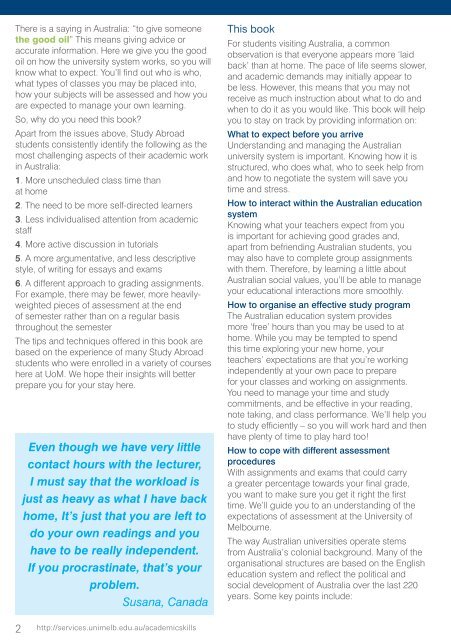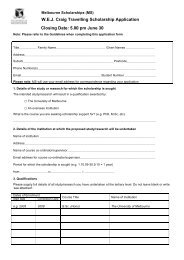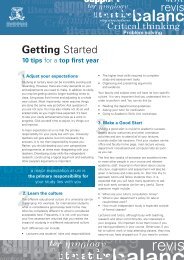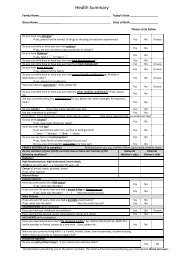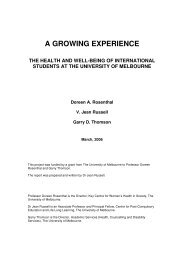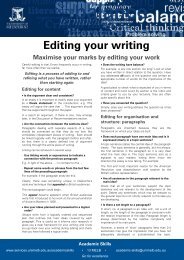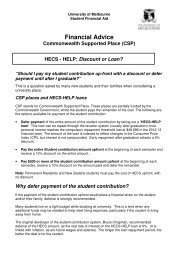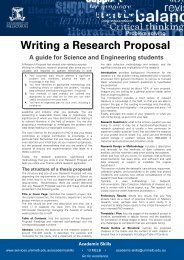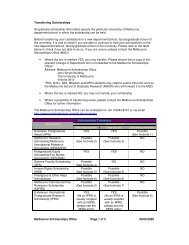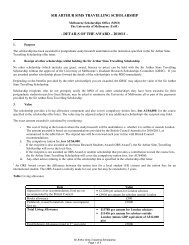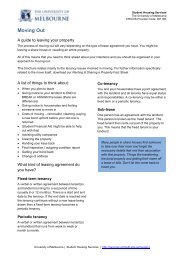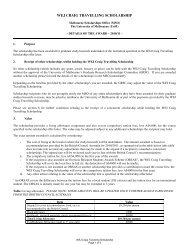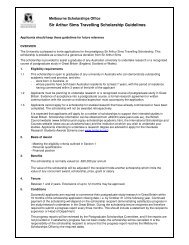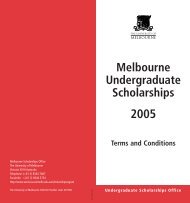Studying in Australia: The Study Abroad Student's Guide to Success
Studying in Australia: The Study Abroad Student's Guide to Success
Studying in Australia: The Study Abroad Student's Guide to Success
Create successful ePaper yourself
Turn your PDF publications into a flip-book with our unique Google optimized e-Paper software.
<strong>The</strong>re is a say<strong>in</strong>g <strong>in</strong> <strong>Australia</strong>: “<strong>to</strong> give someonethe good oil” This means giv<strong>in</strong>g advice oraccurate <strong>in</strong>formation. Here we give you the goodoil on how the university system works, so you willknow what <strong>to</strong> expect. You’ll f<strong>in</strong>d out who is who,what types of classes you may be placed <strong>in</strong><strong>to</strong>,how your subjects will be assessed and how youare expected <strong>to</strong> manage your own learn<strong>in</strong>g.So, why do you need this book?Apart from the issues above, <strong>Study</strong> <strong>Abroad</strong>students consistently identify the follow<strong>in</strong>g as themost challeng<strong>in</strong>g aspects of their academic work<strong>in</strong> <strong>Australia</strong>:1. More unscheduled class time thanat home2. <strong>The</strong> need <strong>to</strong> be more self-directed learners3. Less <strong>in</strong>dividualised attention from academicstaff4. More active discussion <strong>in</strong> tu<strong>to</strong>rials5. A more argumentative, and less descriptivestyle, of writ<strong>in</strong>g for essays and exams6. A different approach <strong>to</strong> grad<strong>in</strong>g assignments.For example, there may be fewer, more heavilyweightedpieces of assessment at the endof semester rather than on a regular basisthroughout the semester<strong>The</strong> tips and techniques offered <strong>in</strong> this book arebased on the experience of many <strong>Study</strong> <strong>Abroad</strong>students who were enrolled <strong>in</strong> a variety of courseshere at UoM. We hope their <strong>in</strong>sights will betterprepare you for your stay here.Even though we have very littlecontact hours with the lecturer,I must say that the workload isjust as heavy as what I have backhome, It’s just that you are left <strong>to</strong>do your own read<strong>in</strong>gs and youhave <strong>to</strong> be really <strong>in</strong>dependent.If you procrast<strong>in</strong>ate, that’s yourproblem.Susana, CanadaThis bookFor students visit<strong>in</strong>g <strong>Australia</strong>, a commonobservation is that everyone appears more ‘laidback’ than at home. <strong>The</strong> pace of life seems slower,and academic demands may <strong>in</strong>itially appear <strong>to</strong>be less. However, this means that you may notreceive as much <strong>in</strong>struction about what <strong>to</strong> do andwhen <strong>to</strong> do it as you would like. This book will helpyou <strong>to</strong> stay on track by provid<strong>in</strong>g <strong>in</strong>formation on:What <strong>to</strong> expect before you arriveUnderstand<strong>in</strong>g and manag<strong>in</strong>g the <strong>Australia</strong>nuniversity system is important. Know<strong>in</strong>g how it isstructured, who does what, who <strong>to</strong> seek help fromand how <strong>to</strong> negotiate the system will save youtime and stress.How <strong>to</strong> <strong>in</strong>teract with<strong>in</strong> the <strong>Australia</strong>n educationsystemKnow<strong>in</strong>g what your teachers expect from youis important for achiev<strong>in</strong>g good grades and,apart from befriend<strong>in</strong>g <strong>Australia</strong>n students, youmay also have <strong>to</strong> complete group assignmentswith them. <strong>The</strong>refore, by learn<strong>in</strong>g a little about<strong>Australia</strong>n social values, you’ll be able <strong>to</strong> manageyour educational <strong>in</strong>teractions more smoothly.How <strong>to</strong> organise an effective study program<strong>The</strong> <strong>Australia</strong>n education system providesmore ‘free’ hours than you may be used <strong>to</strong> athome. While you may be tempted <strong>to</strong> spendthis time explor<strong>in</strong>g your new home, yourteachers’ expectations are that you’re work<strong>in</strong>g<strong>in</strong>dependently at your own pace <strong>to</strong> preparefor your classes and work<strong>in</strong>g on assignments.You need <strong>to</strong> manage your time and studycommitments, and be effective <strong>in</strong> your read<strong>in</strong>g,note tak<strong>in</strong>g, and class performance. We’ll help you<strong>to</strong> study efficiently – so you will work hard and thenhave plenty of time <strong>to</strong> play hard <strong>to</strong>o!How <strong>to</strong> cope with different assessmentproceduresWith assignments and exams that could carrya greater percentage <strong>to</strong>wards your f<strong>in</strong>al grade,you want <strong>to</strong> make sure you get it right the firsttime. We’ll guide you <strong>to</strong> an understand<strong>in</strong>g of theexpectations of assessment at the University ofMelbourne.<strong>The</strong> way <strong>Australia</strong>n universities operate stemsfrom <strong>Australia</strong>’s colonial background. Many of theorganisational structures are based on the Englisheducation system and reflect the political andsocial development of <strong>Australia</strong> over the last 220years. Some key po<strong>in</strong>ts <strong>in</strong>clude:2 http://services.unimelb.edu.au/academicskills


